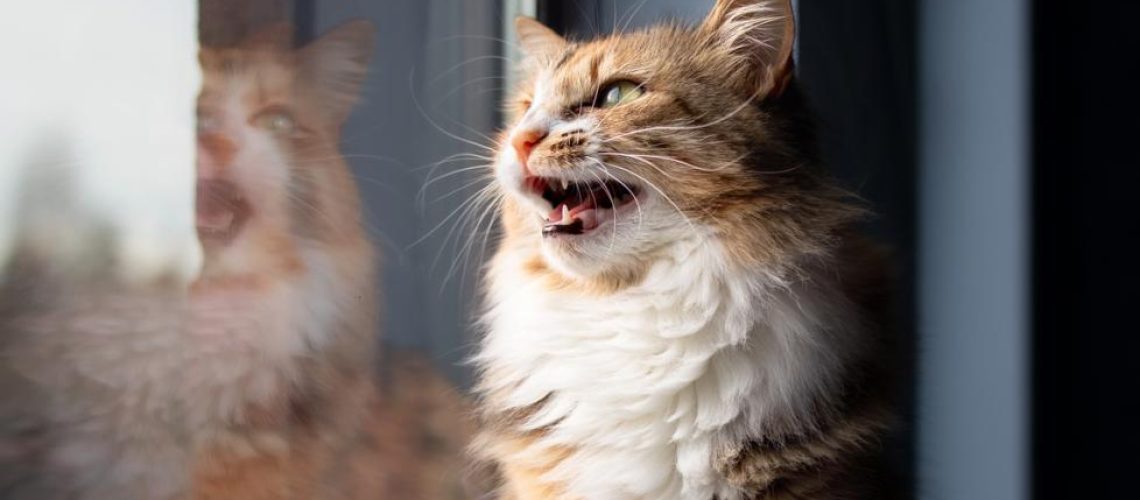Are you tired of your cat's incessant meowing driving you up the wall? Well, get ready to discover the secret to a peaceful and quiet home with our guide on how to quiet a noisy cat. Whether you're a cat owner or just someone who appreciates tranquility, understanding this topic is essential for maintaining a calm environment. Did you know that cats can produce sounds as loud as 85 decibels? That's equivalent to the noise level of heavy traffic! But fear not, because we've got you covered. In this article, we'll explore practical tips and techniques to help silence your feline friend's loud meows once and for all. So say goodbye to sleepless nights and hello to blissful serenity in your home!
Key Takeaways:
- Understanding the reason behind a cat's loud meowing is essential in addressing the issue effectively.
- Providing enough mental and physical stimulation can help reduce excessive vocalization in cats.
- Regular veterinary check-ups are important to rule out any underlying medical conditions that may be causing a cat to meow loudly.
- Using positive reinforcement techniques, such as rewarding quiet behavior, can encourage a cat to be less noisy.
- Implementing environmental changes, such as creating quiet spaces or using white noise machines, can help minimize a cat's loud meowing.
Why Do Some Cats Make Loud Meowing Sounds?
Cats use meowing to communicate
Cats are known for their vocal nature, and meowing is one of the ways they communicate with humans. When a cat meows loudly, it could be trying to get your attention or expressing its needs. For example, if a cat is hungry or wants to go outside, it may meow loudly to let you know.
Another reason why cats make loud meowing sounds is during mating season. Female cats in heat can become very vocal, attracting male cats with their loud calls. This behavior is natural and instinctual for them.
Loud meowing can indicate distress
In some cases, loud meowing can be a sign that something is wrong with your cat. If your usually quiet cat suddenly starts meowing loudly and excessively, it may be experiencing pain or discomfort. It's important to pay attention to any changes in your cat's behavior and consult a veterinarian if necessary.
Additionally, older cats may develop cognitive issues such as dementia, which can cause them to meow loudly and aimlessly. This condition is known as "senile yowling" and requires proper care and attention from pet owners.
Common Reasons for Noisy Cats
Hunger and thirst
One common reason why cats make loud meowing sounds is because they are hungry or thirsty. Cats have specific feeding schedules and when they feel hungry or thirsty, they will often let you know by meowing loudly. It's important to ensure that your cat has access to fresh water at all times and feed them according to their dietary needs.
Boredom and loneliness
Cats are curious creatures who need mental and physical stimulation. If a cat is bored or feeling lonely, it may resort to meowing loudly as a way to seek attention. Providing interactive toys, scratching posts, and spending quality time with your cat can help alleviate boredom and reduce excessive meowing.
How Excessive Meowing Affects Cat Owners and Their Homes
Excessive meowing can be disruptive for cat owners and their households. It can cause stress, especially if the loud meows occur at night and disturb sleep. Additionally, constant meowing can be annoying for neighbors in apartment buildings or close-knit communities.
Moreover, excessive meowing may indicate an underlying issue that needs to be addressed. Ignoring the problem could lead to further behavioral problems or health complications for your cat.
To maintain a peaceful environment and ensure the well-being of both you and your cat, it's important to address excessive meowing through appropriate techniques and interventions.
Effective Methods to Calm Down a Noisy Cat
Provide a calm and safe space
Cats need a quiet and secure space where they can relax and feel safe. Creating a designated area with comfortable bedding, toys, and scratching posts can help reduce anxiety-induced meowing. Make sure this space is away from noisy household activities.
Use positive reinforcement training
Positive reinforcement training involves rewarding desired behaviors with treats or praise. By using this method consistently when your cat remains quiet or exhibits calm behavior, you can encourage them to associate being quiet with positive rewards.
Simple Techniques to Reduce a Cat's Loud Meowing
- Stick to a regular feeding schedule so your cat knows when to expect meals.
- Avoid responding immediately to every meow, as this can reinforce the behavior. Instead, wait for a pause in the meowing before providing attention or fulfilling their needs.
- Provide environmental enrichment through interactive toys, puzzle feeders, and scratching posts to keep your cat mentally stimulated and engaged.
- Consider using calming pheromone diffusers or sprays that mimic natural feline pheromones to create a soothing environment for your cat.
Toys and Activities That Keep Cats Entertained and Quiet
Cats are natural hunters and need activities that simulate their instinctual behaviors. Providing interactive toys such as feather wands, laser pointers, or treat-dispensing puzzles can keep them entertained and mentally stimulated. These toys allow cats to engage in play while satisfying their hunting instincts.
In addition to toys, setting up a cat tree or installing shelves at different heights can provide vertical space for your cat to explore and observe its surroundings. This helps prevent boredom and reduces the likelihood of excessive meowing due to lack of stimulation.
Reducing Loud Meows through Changes in a Cat's Environment or Routine
Create a consistent routine
Cats thrive on routine, so establishing a consistent daily schedule for feeding times, play sessions, and quiet time can help reduce loud meowing. Consistency provides cats with a sense of security and predictability.
Ensure physical comfort
Make sure your cat has access to clean litter boxes that are easily accessible. Cats may meow loudly if they are uncomfortable using dirty litter boxes or if they have difficulty accessing them.
Additionally, provide comfortable resting areas with soft bedding where your cat can relax undisturbed. Ensuring proper temperature control in your home is also important for your cat's comfort.
In conclusion, if you have a noisy cat, there are several steps you can take to help quiet them down. By understanding their needs, providing them with attention and playtime, and seeking professional help if necessary, you can create a peaceful environment for both you and your furry friend.
How do you quiet a noisy cat?
To reduce excessive meowing, refrain from giving attention when your pet meows. Instead, provide attention when they are quiet. If they begin meowing again, either look away or walk away. However, it is important not to completely ignore your pet.
What does it mean when cats meow really loud?
Your cat may be meowing excessively due to hunger, fear, illness, or a need for attention and affection. Cats produce various meow sounds in different situations. If your cat is continuously meowing, it can be difficult for you to determine the cause.
How do I get my elderly cat to stop yowling?
Cats that have vision or hearing impairments can benefit from having night lights or sleeping in a bathroom with a ventilation fan or radio on to provide soothing background noise. Using a Feliway plug-in diffuser can also help these cats relax and feel secure by releasing a calming pheromone. Some cats may yowl because they are hungry.
What sound calms cats down?
Soft classical music has a soothing effect on both humans and cats, helping to promote relaxation and a steady heartbeat. In some cats, it can even cause their pupils to constrict.
How do you quiet an anxious cat?
If you observe that your cat appears to be nervous, you can try closing the curtains and playing some music or turning on the television to create a safe and cozy environment for them. This can be especially helpful if your cat is frightened by external factors that you cannot control, such as loud noises like fireworks.
What does it mean when a cat is trilling?
Trilling is a sound commonly made by adult cats to show affection and happiness. Your cat may also use trilling as a means of indicating they desire to be petted or to get your attention.

















